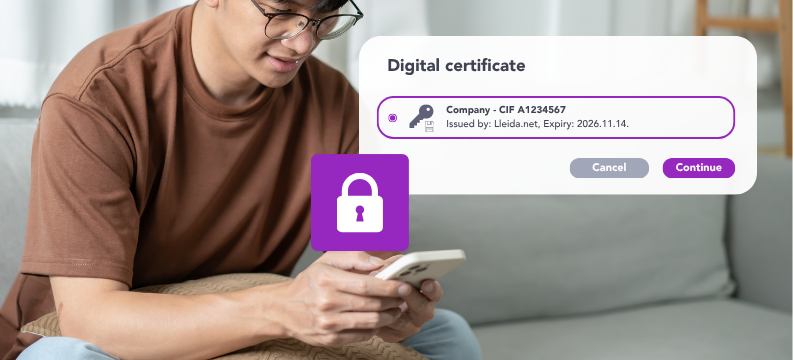A last-minute contract with a client. A tax filing with the Spanish Tax Agency. The onboarding of a new supplier. In Spain, business happens online, and it must be resolved quickly.
The question is: how do you prove it’s really you signing? And how can you ensure the document stays unchanged and legally valid?
That’s the role of digital certificates in Spain.
They verify identity, protect transactions, and ensure legal recognition — not only in Spain, but also across the European Union.
Table of contents
What is a digital certificate?
A digital certificate is more than just a file. It’s your official identity in the online world. A Certification Authority (CA) issues it to securely link a person or organisation to a cryptographic key, acting like a digital passport.
In practice, a valid certificate allows you to:
- Identify yourself online with Spanish public administrations and private companies
- Sign electronic documents with the same legal validity as a handwritten signature (depending on the certificate type)
- Guarantee document integrity, and detect any modification.
- Protect digital transactions and communications, with legal proof of every step.
Types of digital certificates in Spain and the EU
Not all digital certificates serve the same purpose. Depending on whether you are a citizen, a business, or an institution, you may need a specific type.
Personal certificate
Your personal digital identity. It allows citizens to file tax returns with the Tax agency, manage Social Security and deal with local services without queues or paperwork.
Corporate certificate
Designed for businesses and organisations. It authenticates the entity in contracts, filings, or agreements with the administration.
Electronic seal certificate
Ideal for companies and institutions that issue automated documents such as invoices, notifications, or certificates. It guarantees authenticity and origin without human action.
Qualified electronic signature certificate
The highest level. Equivalent to a handwritten signature and legally binding across the EU, it offers maximum legal security for critical operations and high-value contracts.
Legal framework
Digital certificates in Spain are regulated by two main laws::
- eIDAS Regulation (EU 910/2014): the European framework for electronic identification and trust services It recognises qualified electronic signatures as equal to handwritten ones.
- Spanish Law 59/2003 on electronic signatures: the national rule defining their validity and use.
This means that a certificate issued by a qualified Trust Service Provider has full legal validity in Spain and the EU, and can be used as evidence in court.
Practical use cases
Digital certificates are not just a technical tool, they are essential for secure online activity.
They enable citizens, businesses, and institutions to operate safely every day.
- For citizens: filing taxes, managing Social Security, or communicating with local authorities.
- For businesses: signing employment contracts, validating suppliers, onboarding customers, and reducing fraud risks
- For international operations: ensuring contracts are legally recognised not only in Spain but across the EU and in many Latin American countries
Benefits of digital certificates
- Legal certainty: every signature and transaction has a valid legal trail
- Efficiency: less paperwork, faster procedures, and no queues.
- Integrity: documents cannot be altered without detection
- Trust: users, companies, and administrations interact securely and transparently
FAQs
Are digital certificates legally valid in Spain?
Yes. Certificates issued by a qualified provider have full legal validity in Spain and across the European Union. They are regulated by the eIDAS Regulation (910/2014) and the Spanish Electronic Signature Law 59/2003, meaning they can be used as evidence in European courts.
Who can apply for a digital certificate?
Any individual, company or institution doing business in Spain or the EU. They are commonly used by citizens, SMEs and multinational organisations to prove identity online, sign documents with legal effect, and secure digital transactions.
What is the difference between a digital certificate and an electronic signature?
A digital certificate is the credential that verifies your official identity online. The electronic signature is the action of applying that credential to a document. Depending on the certificate type, the signature may carry the same legal validity as a handwritten one across the EU.
Where are digital certificates typically used?
- Filing tax returns and social security documents with Spanish authorities.
- Signing employment, commercial and cross-border contracts.
- Onboarding and verification of clients, suppliers or partners in regulated sectors (finance, insurance, telecoms).
- Transactions legally recognised across the EU and in many Latin American countries.
How long is a digital certificate valid for?
Most certificates are valid for 2 to 4 years, depending on the issuing provider’s policy. After that period, they must be renewed to remain active and legally valid.
What happens if a digitally signed document is altered?
The signature immediately becomes invalid. Any modification is detected by the system, which breaks the integrity of the document. This protects both the sender and the recipient against fraud or manipulation.
Are digital certificates safe for corporate use?
Yes. Certificates issued under eIDAS and Spanish law meet strict EU security standards. They ensure identity authentication, document integrity and generate legally admissible evidence of every transaction.
Are digital certificates recognised outside Spain?
Yes. Qualified certificates issued in Spain are recognised throughout the EU under eIDAS. Many Latin American countries also accept them within their regulatory frameworks, making them useful for international operations.
Conclusion
In Spain, digital certificates are essential for secure business. They ensure that every signature and every document has identity, legal validity, and full protection.
Whether you are a citizen, a company or an institution, adopting them means saving time, reducing risks, and building trust in every transaction.
At Lleida.net, as a qualified Trust Service Provider under eIDAS, we issue digital certificates recognized in Europe and Latin America. Our certificates integrate with electronic signature solutions, automation, and registered communications to give your processes full legal traceability.
